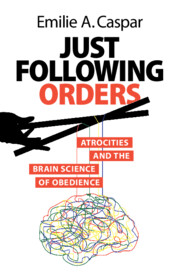Book contents
- Just Following Orders
- Just Following Orders
- Copyright page
- Contents
- Figures
- Preface
- Acknowledgments
- Introduction: Understanding Genocide as a Means to Prevention
- Chapter 1 Listening to the Perpetrators of Genocide
- Chapter 2 A Brief History of the Experimental Research on Obedience
- Chapter 3 How Do We Take Ownership over and Responsibility for Our Own Actions?
- Chapter 4 Moral Emotions under Obedience
- Chapter 5 Just Giving Orders? In the Brains of Those Who Command
- Chapter 6 Desolation Is Everywhere
- Chapter 7 Conclusion: How Ordinary People Stand Up against Immorality
- Epilogue: A Hopeful Horizon
- References
- Index
Chapter 3 - How Do We Take Ownership over and Responsibility for Our Own Actions?
Published online by Cambridge University Press: aN Invalid Date NaN
- Just Following Orders
- Just Following Orders
- Copyright page
- Contents
- Figures
- Preface
- Acknowledgments
- Introduction: Understanding Genocide as a Means to Prevention
- Chapter 1 Listening to the Perpetrators of Genocide
- Chapter 2 A Brief History of the Experimental Research on Obedience
- Chapter 3 How Do We Take Ownership over and Responsibility for Our Own Actions?
- Chapter 4 Moral Emotions under Obedience
- Chapter 5 Just Giving Orders? In the Brains of Those Who Command
- Chapter 6 Desolation Is Everywhere
- Chapter 7 Conclusion: How Ordinary People Stand Up against Immorality
- Epilogue: A Hopeful Horizon
- References
- Index
Summary
Humans have the ability to recognize that when they perform actions, they produce effects in the external world. Even though humans are not the only animalsl with this mental capacity, their ability to perform actions is accompanied by a feeling of authorship, a feeling that “I” am the one who did it. This is what academics have called the sense of agency. When individuals claim reduced responsibility because they were “only obeying orders”, this defense is often viewed with skepticism, because the defendant has a clear motive of avoiding punishment. However, scientific methods can now be used to investigate the experience of receiving orders and how it influences how the brain processes information. As this chapter shows, obeying orders impacts the sense of agency and the feeling of responsibility at the brain level. Further, working and living in some highly hierarchical and sometimes coercive social structures, such as the military, can also impact the sense of agency when people make decisions. It thus appears that hierarchies provide a powerful ground to obtain a reduced feeling of responsibility and agency in individuals.
Keywords
- Type
- Chapter
- Information
- Just Following OrdersAtrocities and the Brain Science of Obedience, pp. 87 - 112Publisher: Cambridge University PressPrint publication year: 2024



